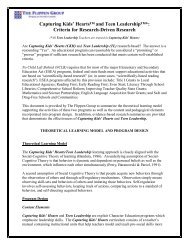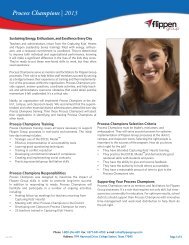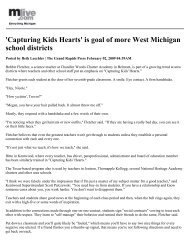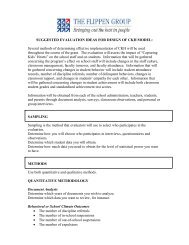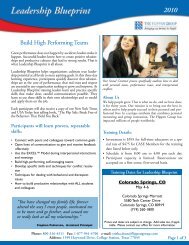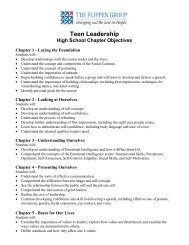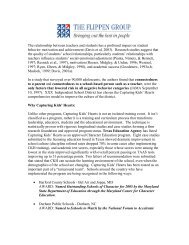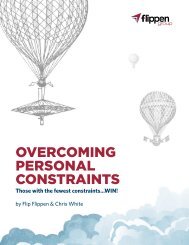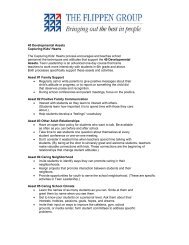Smart & Good High Schools - The Flippen Group
Smart & Good High Schools - The Flippen Group
Smart & Good High Schools - The Flippen Group
- No tags were found...
Create successful ePaper yourself
Turn your PDF publications into a flip-book with our unique Google optimized e-Paper software.
CHAPTER 5: Fostering the 8 Strengths of Character—Outcome 2Outcome 2:DILIGENT AND CAPABLE PERFORMERA DILIGENT AND CAPABLE PERFORMER . . .◆ Strives for excellence; gives best effort◆ Demonstrates initiative and self-discipline◆ Knows standards of quality and creates highqualityproducts; takes pride in work◆ Sets personal goals and assesses progress◆ Perseveres in the face of difficulty.In their book Classroom Instruction That Works: Research-Based Strategies for Increasing Student Achievement, R.J.Marzano and colleagues report this finding: Students whobelieve that achievement is something that they earn, andnot primarily the result of innate abilities, do best inschool. 1Students who believe thatachievement is something theyearn do best in school.Similarly, research on talent development in teens (discussedon pages 24-25) finds that adolescents who aremore successful than equally gifted peers in developingtheir natural talent to a high level have a stronger“achievement and endurance orientation” and bettergoal-setting skills and work habits. 2Findings like these confirm everyday observation: Inschool and in life, achievement is, to a large extent, afunction of character. Our innate ability is clearly a factor,but our performance character—qualities such as effort,initiative, positive attitude, and perseverance—determineswhat we do with our natural ability. How can we help allstudents develop these character strengths, so that theystrive for excellence and give their best effort—the distinguishingmark of a diligent and capable performer?Giving our best effort, of course, doesn’t mean that wecan be our best, in an absolute sense, all of the time. Performancewill inevitably vary as a function of internal andexternal variables (how many competing demands we’refacing, how much support and challenge we experiencefrom our environment, how tired we are, and so on). Butperformance character means, “Even if at this time and inthis situation, I’m only operating at 50% of my capacity,I’m going to give 100% of that.”Our efforts are greatly affected by our ambitions. Ambitionsare goals that provide direction and therefore motivatebest effort. In their book <strong>The</strong> Ambitious Generation,Barbara Schneider and David Stevenson write:Ambitions are an important part of the lives of adolescents. . . . <strong>The</strong>y can use their ambitions like a compass to helpchart a life course and to provide direction for spendingtheir time and energy. Ambitions can increase the chancesthat adolescents will take schoolwork seriously, gain admissionto the college of their choice, and view their success asthe product of hard work. Ambitions developed during adolescencehave lifelong significance. 3Christopher Unger, a researcher at Brown University’sEducational Alliance, argues that in order to foster ambition,high schools must help young people see that whatthey learn in school will contribute to their subsequentsuccess and happiness in life. 4 As one example of a schoolthat helps teens see that connection, Unger cites a careermagnet high school with academies in law and publicservice, health, and trades such as horticulture, electronics,and construction. Students in this school said theyliked the school programs because even in 9th and 10thgrades,they could “see where they are going” and thatschool was providing them with the training to get there.(See also Futures for Kids, page 8.)Furthermore, if we wish to motivate students to careabout their work and to become diligent and capable performers,we should provide opportunities for them toexperience what it feels like to achieve excellence. Herewe return to Ron Berger’s observation in An Ethic of Excellence:“After students have had a taste of excellence,they’re never quite satisfied with less.” 5 A boy on our StudentLeaders Panel echoed that sentiment:<strong>The</strong> successful person has the habit of doingthe things failures don’t like to do. Successfulpeople don’t like doing them either necessarily.But their disliking is subordinated to thestrength of their purpose.—E.M. GRAY102<strong>Smart</strong> & <strong>Good</strong> <strong>High</strong> <strong>Schools</strong>




